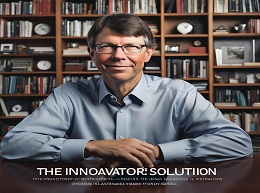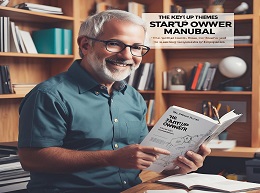Jugaad Innovation: Think Frugal, Be Flexible, Generate Breakthrough Growth

Jugaad Innovation: Think Frugal, Be Flexible, Generate Breakthrough Growth
"Jugaad Innovation: Think Frugal, Be Flexible, Generate Breakthrough Growth" by Navi Radjou, Jaideep Prabhu, and Simone Ahuja offers a compelling look at an unconventional yet powerful approach to innovation. Rooted in the Hindi word "jugaad," which roughly translates to a flexible, frugal, and ingenious solution, this book challenges traditional Western notions of innovation. The authors argue that in today's fast-paced, resource-constrained world, jugaad innovation can drive significant breakthroughs and sustainable growth.
About the Authors
Navi Radjou is an innovation and leadership advisor based in Silicon Valley. Jaideep Prabhu is a professor at the University of Cambridge Judge Business School, and Simone Ahuja is the founder of Blood Orange, a marketing and strategy consultancy. Together, they bring a wealth of experience and diverse perspectives to the table, making "Jugaad Innovation" a rich and insightful read.
The Structure of the Book
The book is structured around six principles of jugaad innovation, each explored in a dedicated chapter:
1. Seek Opportunity in Adversity
2. Do More with Less
3. Think and Act Flexibly
4. Keep It Simple
5. Include the Margin
6. Follow Your Heart
Each principle is illustrated with real-world examples and case studies, providing readers with a clear understanding of how jugaad innovation can be applied in various contexts.
Turning Challenges into Opportunities
The first principle of jugaad innovation is to seek opportunity in adversity. The authors emphasize that constraints can actually foster creativity by forcing individuals and organizations to think differently and find innovative solutions.
Example: Tata Nano
The Tata Nano is a prime example of turning adversity into opportunity. Faced with the challenge of creating an affordable car for the Indian market, Tata Motors designed the Nano, the world's cheapest car. By rethinking traditional car manufacturing processes and materials, Tata Motors was able to produce a vehicle that met the needs of millions of Indian consumers.
Frugality as a Driver of Innovation
The second principle, doing more with less, highlights the importance of frugality in the innovation process. The authors argue that resource constraints can lead to more efficient and effective solutions.
Example: M-Pesa
M-Pesa, a mobile money transfer service in Kenya, exemplifies frugal innovation. With limited access to traditional banking infrastructure, M-Pesa leveraged the widespread use of mobile phones to provide financial services to millions of unbanked Kenyans. This low-cost, high-impact solution transformed the financial landscape in Kenya and has been replicated in other countries.
Embracing Agility and Adaptability
The third principle is to think and act flexibly. Jugaad innovators are not wedded to rigid plans or processes; instead, they adapt to changing circumstances and seize new opportunities as they arise.
Example: Ziqitza Healthcare Limited
Ziqitza Healthcare Limited (ZHL) provides emergency medical services in India. Initially focused on urban areas, ZHL quickly adapted its business model to serve rural communities by using a combination of ambulances and local transportation methods. This flexible approach allowed ZHL to expand its reach and save more lives.
The Power of Simplicity
The fourth principle emphasizes the importance of simplicity in innovation. By keeping solutions straightforward and user-friendly, jugaad innovators can more effectively meet the needs of their customers.
Example: GE’s Mac 400 ECG Machine
GE Healthcare's Mac 400 ECG machine is a testament to the power of simplicity. Designed for use in rural India, the Mac 400 is portable, battery-operated, and easy to use, providing affordable heart monitoring to underserved populations. This simple yet effective device has had a significant impact on healthcare in resource-constrained settings.
Empowering the Marginalized
The fifth principle of jugaad innovation is to include the margin, meaning to focus on solutions that empower marginalized and underserved communities. By addressing the needs of these groups, innovators can create inclusive and sustainable growth.
Example: Aravind Eye Care System
The Aravind Eye Care System in India provides low-cost, high-quality eye care to millions of patients, many of whom are from poor and rural backgrounds. By adopting a high-volume, low-cost business model, Aravind has made eye care accessible to those who need it most, demonstrating the power of inclusive innovation.
Passion and Purpose in Innovation
The sixth and final principle is to follow your heart. Jugaad innovators are driven by passion and a sense of purpose, which fuels their creativity and determination to overcome obstacles.
Example: SELCO India
SELCO India, founded by social entrepreneur Harish Hande, provides solar energy solutions to underserved communities. Driven by a mission to improve lives through sustainable energy, SELCO has brought light to thousands of households, schools, and businesses in rural India. Hande's passion and commitment to social impact have been key to SELCO's success.
Practical Insights and Takeaways
"Jugaad Innovation" is filled with practical insights and actionable advice for individuals and organizations looking to embrace frugal and flexible innovation. Key takeaways include:
- Embrace Constraints : View constraints as opportunities to innovate rather than obstacles.
- Leverage Existing Resources : Make the most of available resources to create cost-effective solutions.
- Be Agile : Adapt quickly to changing circumstances and seize new opportunities.
- Simplify : Focus on simple, user-friendly solutions that meet the needs of your customers.
- Empower Marginalized Groups : Innovate with a focus on inclusivity and social impact.
- Follow Your Passion : Let your passion and sense of purpose drive your innovation efforts.
Real-World Applications of Jugaad Innovation
To illustrate the principles outlined in "Jugaad Innovation," it's helpful to look at real-world applications of frugal and flexible innovation:
Frugal Engineering in the Automotive Industry
Automotive companies like Renault and Nissan have adopted frugal engineering principles to create affordable and efficient vehicles for emerging markets. By rethinking design and production processes, these companies have developed cars that meet the needs of price-sensitive consumers without compromising on quality or performance.
Healthcare Innovation in Resource-Limited Settings
In resource-limited settings, healthcare innovators are finding creative ways to deliver essential services. For example, the Jaipur Foot, a low-cost prosthetic limb, has transformed the lives of thousands of amputees in developing countries. By using locally available materials and simple manufacturing techniques, the Jaipur Foot provides an affordable and effective solution for those in need.
Education Technology for Underserved Communities
Education technology companies are using frugal innovation to bridge the digital divide and provide quality education to underserved communities. Companies like Byju's in India offer affordable and accessible online learning platforms that cater to the needs of students in both urban and rural areas.
"Jugaad Innovation: Think Frugal, Be Flexible, Generate Breakthrough Growth" by Navi Radjou, Jaideep Prabhu, and Simone Ahuja is an inspiring and practical guide to frugal and flexible innovation. Through a combination of real-world examples, actionable advice, and insightful analysis, the authors make a compelling case for the power of jugaad innovation in today's resource-constrained world.
Whether you are an entrepreneur, a corporate leader, or simply someone looking to enhance your creative thinking, "Jugaad Innovation" offers the tools and insights needed to navigate the innovation process successfully. By embracing the principles of jugaad innovation, you can unlock new opportunities, drive significant breakthroughs, and create sustainable growth.
In a rapidly changing and increasingly complex world, the ability to think frugally and act flexibly is more important than ever. "Jugaad Innovation" not only inspires readers to embrace this mindset but also equips them with the practical skills needed to turn constraints into opportunities and ideas into reality.













